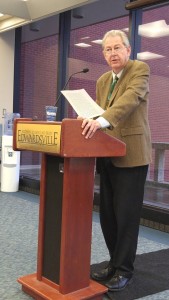Professor makes case for phenomenology as method for religious studies
Dr. Kevin Hart, a leading voice in the application of phenomenology to the study of religion, discussed a widely-debated topic during the Philosophy Department’s annual Fritz Marti lecture March 18.

Dr. Kevin Hart, Professor of Religious Studies at the University of Virginia, speaks at the annual Fritz Marti lecture. (Photo by Joseph Lacdan)
Hart challenged a paper written by renowned French philosopher Paul Ricoeur, titled “Phenomenology as Hermeneutics,” which argued that phenomenology as taught by German philosopher Edmund Husserl was inadequate as a methodology. Husserl, who came to prominence in the early 20th century, is considered the founder of contemporary phenomenology, a method of philosophical view that holds that knowledge begins with the subject or individual.
“Phenomenology has been enormously influential in the history of philosophy,” said SIUE philosophy professor Bryan Lueck, whose research is focused on continental philosophy, and said, “And today in 2016 there are a lot of people in the world of philosophy still influenced by this methodology called phenomenology. But the position called idealism is not a popular position in 2016. So if it turns out it is a kind of idealism that would be a bad thing for phenomenology. Idealism is just not a popular position anymore. So if it’s true that phenomenology is a version of idealism that makes phenomenology look like an implausible methodology. On the other hand, if Hart is right and phenomenology isn’t a version of idealism, that means a lot of people who are suspicious of phenomenology as a methodology don’t need to be suspicious of it.”
Dr. Hart, a professor of Christian Studies at the University of Virginia, argued that the paper unfairly hypothesizes that Husserl was a type of idealist and that Ricoeur’s criticism is unfounded, Lueck said. During Hart’s hour-long speech at the Morris University Center, Hart made the case that phenomenology as taught by Husserl, already had the capacity to be applied to religious studies. Ricoeuer has long been a critic of Husserl’s phenomenology as a means to study the meaning of God and other aspects of religion.
“What Ricoeur argues is that phenomenology is roughly on the right track but because it’s too subject-centered, it wants to understand meaning in terms of the intention of subject and Ricoeur argues that’s wrong,” Lueck said. “Meaning transcends what any particular subject intends or means. He’s going to argue that phenomenology can be a workable methodology as long as it is supplemented by hermeneutics.”
“Hart’s position is that [Ricoeur] is wrong in his criticisms of phenomenology. He thinks Husserl already has the resources to do the things that Ricoeur thinks he cannot do.”
Lueck said Dr. Hart’s position on religious studies is an alternative viewpoint shared by philosophers in the Theological Turn in phenomenology that included French philosophers Jean-Luc Marion, Michel Henry, Jean-Louis Chrétien and American philosopher John Caputo. The movement began with Marion’s book, God without Being, published in 1982. Hart believed that Husserl evolved in his teachings and later showed evidence that phenomenology already was a kind of hermeneutics, which is the philosophical study of textual interpretation. Hart published his first book on phenomenology and religion, The Trespass of the Sign, in 1989. Lueck said Ricoeur, who was influenced by former Husserl pupil and philosopher, Martin Heidegger, formulated the notion that phenomenology required the use of hermeneutics in order to properly function.
“Ricoeur believes that meaning does not begin with subject,” Lueck said. “It’s the other way around. There can only be subject if there is meaning. So Ricoeur criticizes phenomenology for trying to anchor all of the meaning of the world in acts of subjects. And he tries to argue based on, for example, how we make sense of literature. If you try to understand the meaning of a poem or the meaning of a book. It’s not enough just to ask what the author intended because sometimes it happens that you mean more than you thought you meant.”
Lueck said Hart’s findings could hold significant ramifications for the field of philosophy. If Hart is proven correct, it could create new research and educational opportunities for phenomenology’s uses in religious studies. If Hart is proven wrong, as some scholars believe, it could prove difficult for academics like Dr. Hart and other scholars in religious studies.
“He’s in the minority, which is what makes his paper provocative and interesting,” Lueck said. “He’s not arguing for a position that is widely agreed upon. He’s making an argument that most people who work on phenomenology would disagree with. If he is right, that would be a very important fact for the future of phenomenology.”
Filed Under: Philosophy












